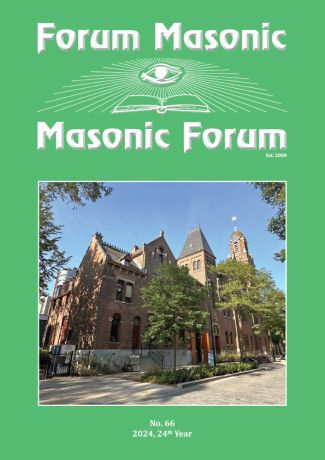CLAUDIU IONESCU
talking to
LUIS BAEZ DELGADO
Grand Master of American Canadian Grand Lodge (Vereinigte Grosslogen von Deutschland)
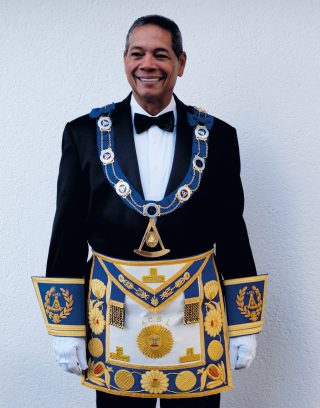
Very good afternoon! My guest today is my Grand Master, M.W. Brother Luis Baez Delgado, Grand Master of the American‑Canadian Grand Lodge within the United Grand Lodges of Germany. Many thanks, Luis, for being with us, for your time and for sharing your Masonic knowledge. I’m honored. Thank you so much.
Thank you. The honor is mine. Dear Brother Claudiu, good afternoon and thank you for the invitation to the Masonic Forum. Thank you for what you do regarding Masonic work and greetings from all your Brothers in Germany.
Thank you so much, I am honored. I would like to introduce our audience to the Masonic life in the American‑Canadian Grand Lodge: how many Masons and Lodges are there, if there are Lodges in other languages – Spanish, Turkish –, what appendant bodies, Ancient and Accepted Scottish Rite Shrine, York Rite and so on.
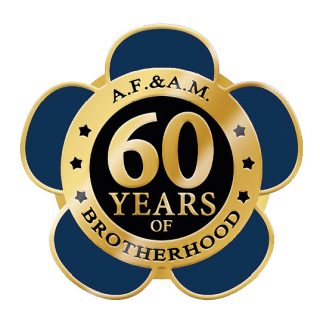
The American‑Canadian Grand Lodge consisted of 46 Lodges, and we are one of five Grand Lodges within the United Grand Lodges of Germany, as you mentioned. Since 2014, the ACGL has made remarkable transformations from its early days as a military Grand Lodge. With the United States’ military bases closing down, the number of US military service members, contractors dwindled to around 35,220 today. Presently we have around 2445 members. Like all the Grand Lodges, we had difficulties from 2019 to the end of 2021, during Covid‑19. One good thing during Corona – we had online meetings, we stayed connected, we opened the doors to our members throughout the world to join, since that was a way of connecting anyone that was at home or working from home. Since September of 2021 we carefully re‑opened our Lodges for physical meetings and gatherings. Also, the ACGL is celebrating 60 years of Brotherhood this year. Masonic life in Germany is great. To your question about appendant bodies: we do have members in the American Military Scottish Rite, the MSRB NATO Club, Valley of Washington, Orient of District of Columbia. They hold regular meetings, participating in Honorary and Outstanding ROTC students, in American high‑schools, in England, Germany and Italy. And then Master Masons that are serving in the military, as well as US passport holders, either military or civilian within Europe, can become members of the MSRB Club. We have around 135 members in the Emirat Shrines International. Members facilitate transportation to seriously ill children from Europe and the Middle East to the Shrines hospitals in the United States. They meet around four times a year, conduct two ceremonials and they do have 17 Shrine clubs within Europe. For many years we’ve come together at the ACGL Communication, as you also participated in the past, where Emirat Shriners and Scottish Rites are honored by escorting and carrying the flag. We are in very good working relationship. We also have members in the Mark Masons and the York Rites within Germany and England.
In which foreign countries does the ACGL have Lodges?
I can tell you we have nine Lodges in France, that have just celebrated the ten‑year anniversary in July of this year. And the ACGL made remarkable transformations from its early days as a military Grand Lodge. As I stated before, with the US military bases closing in Germany, the existence of the Grand Lodge was under threat. But we became the de facto Grand Lodge for non‑Germans to practice Freemasonry with their own rituals, in their own language. Today we have Lodges practicing Freemasonry in English, French, Turkish and Italian, with different rituals in addition to the American ritual. Many members are non‑resident members, who were members during the rotation in Germany and kept their membership while back in the United States. But most of the resident members are non‑military personnel today.
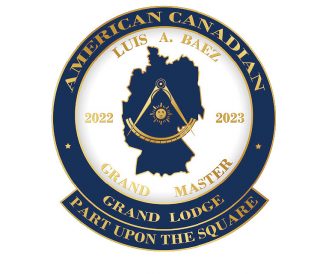
Luis, tell me about your motto as Grand Master. Why did you choose that?
My motto for this year is “part upon the square” and I chose it because after two years of Covid‑19 and meeting online we really had the meetings and big, great things in the media. But when we are physically meeting together we accomplish a lot and we “part upon the square”. That is one of the reasons I chose the motto to continue, and getting back to basics, since we were two years without meeting together. I will explain some more what we are doing today to follow my motto.
The English‑speaking Grand Lodges are losing membership. Is it the same with the membership in the American‑Canadian Grand Lodge? What kind of politics do you have for retaining membership?
I will say that today’s generations differ from the 1960’s. Many work as many hours as they can, with all this work from home, with no real defined hours. They’re never truly off work – that’s today’s business. They just take breaks. They believe in what’s more important to them. With regards to the ACGL, we have improved our meetings. Business meetings have become the responsibility of the elected line with a recap at the appropriate meeting for approval. Lodges have dressed down for normal meetings, dress up during rituals, special communications or events. We are concentrating on individual development, and not on memory work.
Very interesting! What are the relations of the ACGL with the German authorities?
One sentence can describe that: the ACGL has no issues with the German authorities and we are in good relations.
Luis, from your international Masonic experience have you noticed differences between Eastern and Western European Freemasonry, between South and North America? What kind of Freemasonry do you think is closer to what Freemasonry should be?
I’ll say that we are a society with members that share cultures, customs and a way of thinking. For the most part, we may be exclusively of the middle‑class and more specifically mostly of the educated part. Grand Lodges are always on the move, changing and reconfiguring and experiencing their Rite. We are urban residents, with free time and socially active. This fact generates diversity and adaptability to the rituals. We are involved in history, but need to embrace the present and future together. Today we visit each other, interact, learn from each other and conduct joint projects. The future is undoubtedly one of the driving forces behind the development of Freemasonry not only in Germany, but around the world. Despite disagreements, the UGLE and the Grand Orient of France remained bases of the definition of Masonic identity. With regards to what Freemasonry should be, I will say that it should be the one that unites by a single ideology, but with enormous national and regional differences. This simultaneously united diverse community only emphasizes the role that Freemasonry plays around the world.
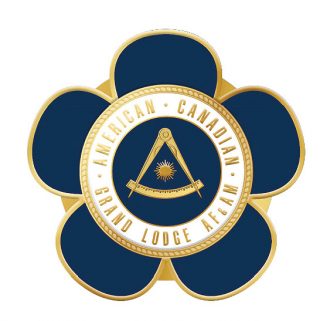
Do you think that nowadays the world needs Freemasonry like in the past? Is Freemasonry somehow eroded? Has Freemasonry become more of a charity organization?
Absolutely, and I have different parts to that answer. In recent developments around the world, with the pandemic disaster and especially now, with the war in Ukraine, Masons have re‑emphasized the principles of Masonry: a helping hand, loyal support, a friendly face and good advice. We have a role in continuing the education and intellectual growth, insisting that learning is about many things, as it is important for anyone to become the best version of themselves as Mason, giving and receiving, relieving and being relieved, supporting and being supported, either individually or collectively. To the question about the erosion of Freemasonry, I will say not at all. Far from being a dead craft, from my personal observations over the years Freemasonry has displayed and demonstrated vividly, intelligently that we are an engaged group of individuals. Like all social‑philanthropic groups since 1960, it has suffered a decline in membership, as you asked. Its societal changes are not a bad thing, and it’s not the first time for Freemasonry. We will experience a tougher period, but there will be a number of exceptional Lodges, Grand Lodges, that will stand the test of time. With respect to the question about charity I will say that our principles teach us the value of relief and charity. Our dedication is to strengthen a man’s character, improve his moral and spiritual outlook not to be better than others, but better than himself.
The public perception of Freemasonry has changed over time. What has led to these variations? A good public perception results in an increase in the number of members.
Germany’s experienced a real revival, as some Grand Lodges have a waiting list for individuals to join. In some conversations I hear perception is not an issue, in others they have a lot to say. There is no right answer, since Masonry differs from country to country. We need to reboot, to get back to today, like we do to computers and cellphones when something happens to them, as we have done several times in the past. But the modernization is something that cannot be ignored and cannot be avoided. It is absolutely necessary to adapt. We need to overcome and face the thinking of the majority of the population, which is mostly superstition and have a false sense about Freemasonry. We need to demonstrate that we are a caring society meant to help others, both within and without our organization, open our doors to the community, show what we all are and what we do. That is scheduling an open day for the community members to visit the Lodge and to know what we are all about. Show that we have beliefs and standards and that we try to live up to them on a daily basis. We do not need to advertise in newspapers or media, but we do need to be attractive and marketable, not traditional. We need to focus on civic activities and the community, formulating publicity campaigns that exemplify brotherhood, honor and friendship. For some countries, that’s how we became attractive.
Tell me, please, what is the most difficult problem facing Freemasonry today.
Freemasonry is represented by different countries, rituals, practice and institutional structures, various Charters that are often unrelated and do not recognize each other. We are similar in structure and composition, but have not been able to communicate. We need to rethink, engage and embrace at all levels, focus on the quality to develop the next generation of Masonic leaders. Status quo will not hold.
How has the pandemic surprised the ACGL? What lessons should be learned from the pandemic period?
Over the past two years of pandemic we’ve had our trials and tribulations. Many of us learned how to work from the office at home, isolated, and sometimes caring for our families, including house chores, teaching, learning and attending Lodge, but virtually. We have discovered a way of life and a way to stay in touch with each other wherever we may be in the world. Meetings were not as usual, since we were accustomed to meet in person. We learned to meet and greet through a media source. Many attended learning sessions within, also attending Masonic teachings from other Grand Lodges around the world, as I did. We learned to deal with the situation and how to surpass it if we ever get into it again.
How do you see the future of Freemasonry, Luis?
It is an important challenge to us to respect our tradition, stay faithful to our values and at the same time appearing modern and relevant to the younger generation. For example – the language, being able to describe in simple terms, emphasizing the social side of our activities as well as making contributions to society. But modernizing our language doesn’t mean changing our principles. We need to be mindful of the time commitment that we are asking of members, keeping up the pace of our meetings and the importance of fostering a feeling of membership. Technology needs to be adapted in the administration, connectivity, education and rituals. Media, especially websites, need to be attractive, friendly, with essential information, in order to streamline the process of entry to the business meetings, rituals and classes, as I stated before, and include the new Brothers in important work in the Lodge and in the community.
Finally, please let us know your CV, both Masonic and profane.
I’ll try to keep it short. I was born in San Juan, Puerto Rico, I earned a degree in mechanical and agricultural designs and then enlisted in the US Army in 1971. During my tenure in the military I served in a position of non‑commissioned officer in the US, in Korea, Alaska, Hawaii, Latin America, Germany, Bosnia, Kosovo, Kuwait, Iraq. I am the recipient of numerous military awards and recognitions and then I culminated my military career as an aviation task force command sergeant‑major, retiring in September 2004 from the military. I then joined the US Department of Defense Civil Service Program, where I served as an aviation logistician, airfield manager and aviation operations manager for various airfields and radar sites in Europe. I also attended several US aviation administration courses, finally retiring from civil service in April of 2020. I am a member of various civil and military associations.
Past Master of Light of the Three Stars No. 963, Past District Deputy Grand Master and through the ranks to Grand Master since April of this year. I am a member of the Scottish Rite 32nd Knight Commander of the Court of Honor and Past Assistant Reverend of Emirat Shrine International.
Splendid. Thank you so much, Luis.
Thank you for letting me introduce the American Canadian Grand Lodge and wishing you the most success in all you do. Greetings from your Brothers in Germany.
Thank you so much, Luis. I am deeply honored.
